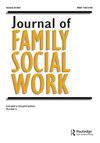亲属转移决策过程的相关因素
IF 0.7
Q3 SOCIAL WORK
引用次数: 6
摘要
在过去的二十年里,儿童福利专业人士认为,当儿童不得不离开家庭时,亲属照顾是限制最少、最像家庭的安置选择。然而,现有文献缺乏对驱动亲属照顾决定的因素的调查,特别是对为什么一些儿童从儿童福利系统(CWS)转移到无偿亲属安排而其他儿童进入传统寄养系统的理解。本研究使用来自全国儿童和青少年福祉调查II (NSCAW II)的基线(第1波)数据,该数据提供了不同类型亲属照顾中儿童和照顾者的信息。采用NSCAW II权值对多个输入数据文件进行多项逻辑回归分析。结果显示,儿童的年龄、社工的教育背景和社工对伤害程度的评估是儿童转入私人亲属照料的重要预测因素。儿童转入自愿亲属照料的重要预测因素包括虐待类型、家庭结构、社工的教育背景和社工对风险水平的评估。区分亲属转移类型对实践和政策具有重要意义。研究各种因素可以帮助儿童福利学者对家庭外安置选择亲属转移的决策过程有一个全面的了解。本文章由计算机程序翻译,如有差异,请以英文原文为准。
Factors Associated with the Decision-Making Process in Kinship Diversion
ABSTRACT During the past two decades, child welfare professionals have given kinship care priority as the preferred least restrictive, most family-like placement option when a child has to be removed from his or her family. However, the available literature lacks investigation into what factors drive the decision to use kinship care, specifically an understanding of why some children are diverted from child welfare system (CWS) into unpaid kinship arrangements while other children enter the traditional foster care system. This study uses baseline (Wave 1) data from the National Survey of Child and Adolescent Well-being II (NSCAW II), which provides information about children and caregivers in different types of kinship care. The data were analyzed using multinomial logistic regression based on the multiple imputed data files using NSCAW II weights. Results show important predictors of a child being diverted into private kinship care included the child’s age, caseworker’s educational background, and caseworker’s assessment of harm level. Important predictors of a child being diverted into voluntary kinship care included the maltreatment type, family structure, caseworker’s educational background, and caseworker’s assessment of risk level. Differentiating between the types of kinship diversion has important implications for practice and policy. Examining a variety of factors can help child welfare scholars develop a comprehensive understanding of the decision-making processes used in selecting kinship diversion for out-of-home placements.
求助全文
通过发布文献求助,成功后即可免费获取论文全文。
去求助
来源期刊

Journal of Family Social Work
SOCIAL WORK-
CiteScore
2.10
自引率
0.00%
发文量
4
期刊介绍:
Each issue of the Journal of Family Social Work contains peer reviewed research articles, conceptual and practice articles, creative works, letters to the editor, and book reviews devoted to innovative family theory and practice subjects. In celebrating social workers" tradition of working with couples and families in their life context, the Journal of Family Social Work features articles which advance the capacity of practitioners to integrate research, theory building, and practice wisdom into their services to families. It is a journal of policy, clinical practice, and research directed to the needs of social workers working with couples and families.
 求助内容:
求助内容: 应助结果提醒方式:
应助结果提醒方式:


